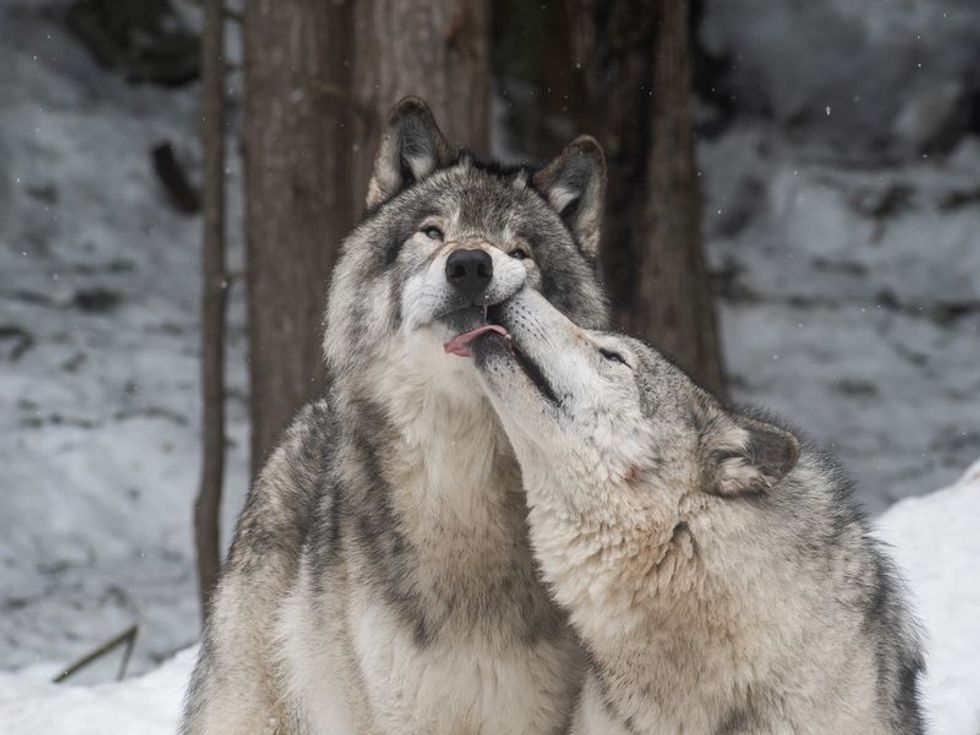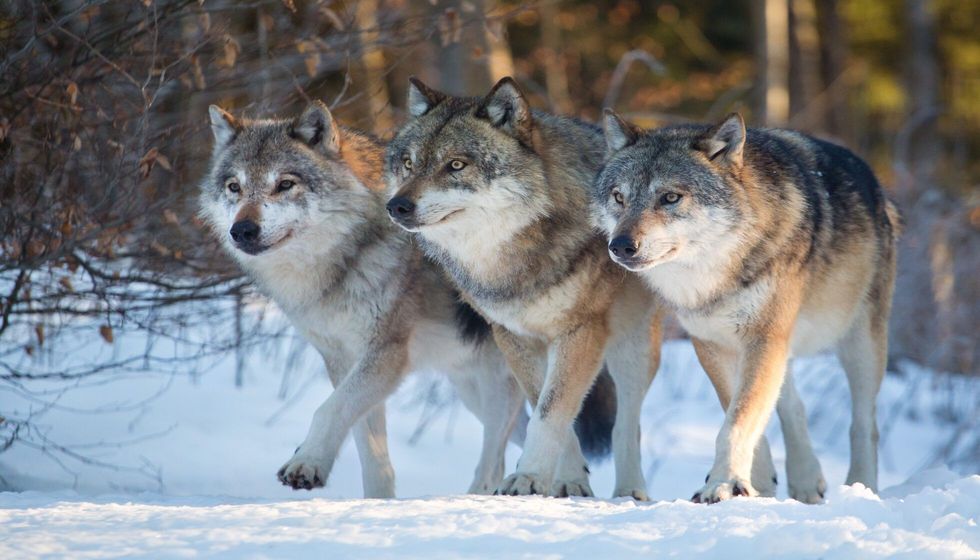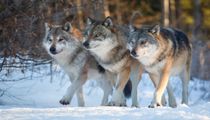Are Wolves Dangerous? Why Are They Considered Apex Predators?

Wolves are usually considered a threat to humans and other animals.
You must have listened to and watched many stories where humans have experienced wolf attacks. Not only humans, but wildlife is also at risk because of wolf attacks.
Wolves are an important and crucial species that are required for a healthy ecosystem. Wolves help to maintain a healthy and fit ecosystem by running a predating chain.
There are other animals that are also considered apex predators who prey on wolves and feed on them. These include Siberian tigers, polar bears, grizzly bears, and scavengers.
These species of animals hunt wolves and eat them to satisfy their hunger. In rare situations, a wolf can eat another wolf too. Overall, wolves are a kind of species that plays a very important role in the ecosystem.
Wolves are known as apex predators as they are on the top of the food chain. Read some astonishing facts about wolves being predators and why they are known as apex predators specifically.
After reading more about dangers that you face when you feed wolves in wildlife, do check out articles about the biggest wolf in the world and if ball pythons are dangerous.
Are wolves a threat to humans?
The wolf-human relationship has been in the limelight for a long time. You may have heard many stories about wolf and human interactions.
Wild wolves keep an eye out and observes its prey for a long time to find its weakness. By understanding and judging the weakness of its prey, it helps wolves to catch their prey by targeting its weak points.
If you are near a forest or a wild place, there is a chance that you may run into a wild wolf.
Wolf attacks are rare occurances. A wild wolf does not bother any human unless an inappropriate human activity is detected by the wolf.
Recent studies have shown that wild wolves usually do not bother humans nor do they attack them frequently. But the fact is that wolf attacks do happen. What is the reason behind so many attacks nowadays if wild wolves do not bother humans at first?
It has been noticed that most wolf attacks occur under specific situations. Wolves only attack when they sense that they are under an attack or feel threatened.
These situations have triggered wolves to attack humans for their own safety. We know that many humans catch and hunt wolves.
There are also many people who put out traps to catch wild wolves for their own purposes. Most wolf attacks are seen in situations when they detect that someone is preying on them. Though, sometimes rabid wolves have been observed to attack humans including children.
This is the reason why rabid wolves are dangerous and a big threat to humans. Rabid wolves are considered a dangerous species that attack and eat humans to satisfy their hunger.
What do you do if a wolf approaches you?
This situation is the most unpredictable one as the wolf never attacks instantly. A wild wolf roams around in nature to find targetable points of its prey.
The presence of a wolf cannot be detected at first as wolves do not allow you to feel their presence near you.
Attacks on humans are very rare but if you are camping in a dense forest with your friends, be ready to witness a wolf approaching you and may be thinking of attacking you. When this happens, the first thing you have to do is not get afraid.
When you witness a wolf approaching you, just stand still. Do not get afraid upon seeing the dangerous and aggressive face of a wolf.
Wolves themselves do not interact with humans generally and avoid coming in contact with them. They will only observe your acts from a distance to determine whether you are a threat to them or not.
As wolves are at high risk of getting attacked by humans, they avoid coming near humans. Additionally, never try to feed wild wolves by offering them anything. Generally, wolves are scared of humans but can easily lose that fear after they get comfortable with humans in any situation.
Wolves love feeding themselves and their young on an easy catch. If you are camping in the forest, never forget to pack up your food and leftovers when you are finished eating.
Leaving food near your camp will attract wolves by encouraging them to approach you for more. If you see a wolf coming towards you, there are simple things you can do to protect yourself.
Just stay calm and composed and do not start to run frantically. If you start running, the wolf will think that you are its potential prey.
Take steps back slowly and gradually while keeping eye contact with the approaching animal. This act will help the wild wolf to think that you are not afraid of it.
Try to make the wolf believe that there is enough space for it to run away and escape from you easily.
Children are at high risk as they are easy to pounce on and attack. Grab small children but do it without bending forward. Bending forward in front of the wild gray wolf species will allow the wolf to think that you have given up and it can catch you.
If you observe that a wild wolf is approaching you aggressively, try to make it believe that you are larger than it is. Raise your arms and make loud noises. Pick up any available object like a stone or anything you see near you and throw it at the wild animal to maintain fear of humans in it.
Wolf-Human Interactions
Wolves are considered a symbol of wildness and strength. In many places and cultures, wolves are worshipped by many people. Wolves help to maintain a healthy and flourishing ecosystem by helping to form a systematic food chain in nature.
A gray wolf will try to avoid interaction with humans in the first place. It is seen that these gray animals tend to fear humans. Many gray wolves are protected in national parks in North America where humans take care of these gray wolves like their own pets.
Wolf-human interactions have always attracted everyone’s interest. Wild gray wolves tend to avoid meeting or coming near humans because of the fear of getting attacked by them.
The fear of humans allows this species to keep a required distance from humans. But if you see a wild wolf attacking a human, the sole reason would be that it is protecting itself from the human.
Wildlife animals have the power of detecting any kind of danger before anyone else. Likewise, wild wolves detect any danger coming towards them.
Attacking is their response to the encounter with the potential danger they detect through their senses. There is a national park in North America called the Yellowstone National Park where these endangered wolves are protected by humans.
It is seen that in the Yellowstone National Park, wolves and humans share a good bond with each other.
North America is a place where gray wolves are protected by feeding them the right food to maintain their health. Additionally, Alaska's national parks have rare animal species along with gray wolves, bears, and tigers.
Humans protect these endangered species as they have a huge role in efficiently maintaining a balance in nature and the ecosystem. To try and better understand the aggressive behavior of wolves, many humans work and interact with wild wolves.
A wolf handles its prey by attacking and pouncing on it. Unless the wolf senses danger, it is seen that humans are not on their prey list.
Wolves’ behavior is misunderstood by many people and hence people have developed a fear of them. No doubt there is a potential risk from any wildlife animal, but wolves are not always a danger to humans.

Are wolves dangerous to pets?
Wolves and other species of wolves including wolfdogs cannot be trusted completely. Due to the fact that they are wild animals, they are highly unpredictable.
Keeping a wolfdog as a domestic pet in your house can be a very dangerous idea as when they feel threatened, they could attack. Domestic pets are generally a kind of animal species that can be domesticated, like dogs.
A dog is an animal species that is highly trusted for its loyalty towards its master. On the other hand, wolves are wild animals that cannot be fully trusted by any human.
Wolves are carnivores that eat the flesh of animals after catching them. They are known as apex predators because of activities they perform to attack other animal species to feed on them.
Wolves do not attack humans but can do so if they encounter what they feel is potential danger or threat.
Other domestic pets are in danger from a wolf attack. Where rabid wolves attack humans the most, a pack of wolves can make a domestic pet their prey for the night.
Places like Canada or Alaska in North America are at high risk from wolf attacks. Many domestic pets have attacked by a pack of wolves over time.
The reason for these pets to get attacked by the pack of wild gray wolves is that they are looked at as prey.
Most of the time, wolves are in search of food and when they find a domestic pet, generally dogs with food, they end up attacking them to feed upon the dog food and on the dog itself. Along with dogs, other pets are also not safe in many countries.
North America's Yellowstone National Park is known to save these wild wolves. No wolf attacks have been recorded against humans in Yellowstone National Park.
But, wolves living there have recognized campsites as feeding grounds because some humans tend to feed wild wolves.
When humans take away the wolf's natural source of food, the wolf has no option but to take people's livestock to eat and satisfy themselves. Authorities keep a look out for threats of wolves and ensure the population is aware they need to stay alert for a possibility of a wolf attack.
Do wolves kill for sport?
Wolves do not kill anyone for sport.
Unlike humans, who have created many sports which include the killing of animals just for fun, wolves do not kill or bother anyone whether it be an animal or human just for the sake of sport. Whenever a wolf attacks any animal species or humans, there is always a motive behind it.
The main reason why wolves would be killing animals or attacking humans is hunger, wanting to attack as the wolf feels it has an encounter with danger, or because of an inappropriate act by any animal or human such as entering the wolf's den.
Wolves are carnivores thus the killing of animals to satisfy hunger is an obvious act. The process of catching prey and it being eaten by a pack of wolves helps nature control the number of a specific type of species in the environment.
Not only do wolves prey on other animals, but many predators exist that are carnivores and kill wolves to eat them. Such animals include bears, tigers, scavengers, and humans too.
Wolves are a vital part of the food chain. But it has never happened that a wolf has attacked any animal or human just for the sake of sport to show others that wolves are superior.
All predators, including wolves, attack and kill animals for their survival. Wolves are carnivores that hunt animals to kill and eat.
It has been seen over the century that wolves only kill someone, whether an animal or human, for food or as an act to protect themselves from danger.
Many people in regions near Alaska have domesticated wolfdogs in their houses. They essentially train them to not hunt down anything innocent.
Many species of wolves attack and kill many animals at once. This uncommon behavior of wolves is termed surplus killing which is done usually in late winter.
In winter, most animals undergo hibernation and it becomes difficult for wolves to find their food. In late winter, when these animals come out from their hibernation state and the availability of food starts to come to the peak level, wolves kill many animals in one go to feed their pack with enough food.
This behavior is very important for their survival. As wolves are carnivores and eat the flesh of animals, they kill different species of animals whenever needed.
Actions To Take When You Encounter A Wolf
Seeing a wolf near you can be a frantic and scary situation and many negative and dangerous thoughts may go through your head. If you encounter a wolf near you, remember one thing: never bend forward or put your head down in front of it.
Doing so will allow the wolf to think that you have surrendered yourself to the wolf and you are an easy target for it.
If you are visiting a national park, it will have safety guidelines written at places where you may encounter a pack of wolves easily. You have to keep some basic yet vital things in mind when you come across a wolf or a wolf pack.
If you encounter a wolf and find it coming near you, keep one thing in mind: wolves are scared of humans. They think that humans are a threat to them.
To protect yourself, you have to show the wolf that you are superior to it and can protect yourself at any cost.
It is advised not to go camping in such areas where there is a high alert of wolves. Also, avoid camping in dense forest areas and avoid going alone in them.
Lone prey is easier to catch and kill by predators than a group of prey. If you go camping in a group, there is a chance that wolves will not bother you.
If you witness a wolf approaching you, do not run away. Rather, stay there, look in its eyes and while maintaining eye contact with the encountering wolf, take small, backward steps away from the wolf.
Having a dog on a leash is a good option when you are planning to visit a place known for wolves.
Having a dog leading your way can protect you from a wolf attack. It has been observed that dogs will fight with wolves to protect you from a wolf attack.
Dogs are the most trustworthy species and they are super loyal to their masters. It has been seen that if their masters are in trouble, dogs have fought bravely with any danger regardless of the size or capability of the danger attacking them.
Having a dog leading your way can be a good option for you to keep yourself protected from wolves. As you know that wolves are scared of humans, take this fear as an advantage to protect yourself from a pack of wolves.
Keep yourself looking larger in front of these wolves.
Additionally, open up your hands and raise your voice to give off a strong impression to the pack of wolves standing in front of you. When they feel that you are on the dominant side, these wolves will abandon the thought of harming you and will try to get away.
Here at Kidadl, we have carefully created lots of interesting family-friendly facts for everyone to enjoy! If you liked our suggestions for are wolves dangerous then why not take a look at are hammerhead sharks dangerous or wolf facts.
We Want Your Photos!
More for You
Sources
https://www.nps.gov/yell/learn/nature/wolves.htm#:~:text=No wolf has attacked aareas and roads with food
See All
Bachelor of Arts specializing in English Literature

Akinwalere OlaleyeBachelor of Arts specializing in English Literature
As a highly motivated, detail-oriented, and energetic individual, Olaleye's expertise lies in administrative and management operations. With extensive knowledge as an Editor and Communications Analyst, Olaleye excels in editing, writing, and media relations. Her commitment to upholding professional ethics and driving organizational growth sets her apart. She has a bachelor's degree in English Literature from the University of Benin, Edo State.
Disclaimer
1) Kidadl is independent and to make our service free to you the reader we are supported by advertising. We hope you love our recommendations for products and services! What we suggest is selected independently by the Kidadl team. If you purchase using the Buy Now button we may earn a small commission. This does not influence our choices. Prices are correct and items are available at the time the article was published but we cannot guarantee that on the time of reading. Please note that Kidadl is a participant in the Amazon Services LLC Associates Program, an affiliate advertising program designed to provide a means for sites to earn advertising fees by advertising and linking to Amazon. We also link to other websites, but are not responsible for their content.
2) At Kidadl, we strive to recommend the very best activities and events. We will always aim to give you accurate information at the date of publication - however, information does change, so it’s important you do your own research, double-check and make the decision that is right for your family. We recognise that not all activities and ideas are appropriate for all children and families or in all circumstances. Our recommended activities are based on age but these are a guide. We recommend that these ideas are used as inspiration, that ideas are undertaken with appropriate adult supervision, and that each adult uses their own discretion and knowledge of their children to consider the safety and suitability. Kidadl cannot accept liability for the execution of these ideas, and parental supervision is advised at all times, as safety is paramount. Anyone using the information provided by Kidadl does so at their own risk and we can not accept liability if things go wrong.
3) Because we are an educational resource, we have quotes and facts about a range of historical and modern figures. We do not endorse the actions of or rhetoric of all the people included in these collections, but we think they are important for growing minds to learn about under the guidance of parents or guardians.







